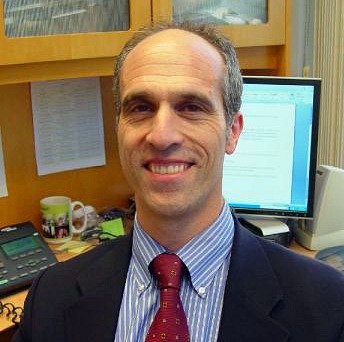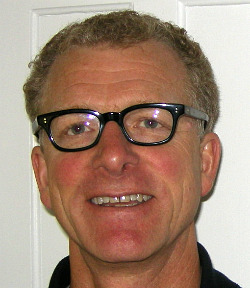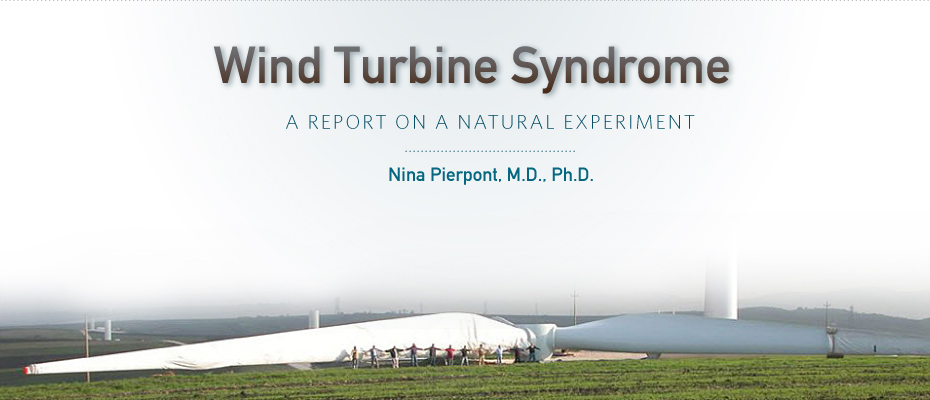“To pee or not to pee on peer review?” (Massachusetts)
Jan 20, 2012
Editor’s note: This is now the burning question, is it not? “To pee or not to pee on peer review?” Doubtless there are many scholarly contexts where peer review is a valuable exercise in “quality control.” (Though not infallible, mind you. I spent a university career both performing peer review and being subjected to it. I could write an entertaining book on the “uses” and “misuses” of peer review.)
But in the case of Wind Turbine Syndrome, the question is especially acute.
Consider this. Wind Turbine Syndrome (WTS) is really almost laughably simple:
(a) People are hale and healthy before turbines turn up in the neighborhood.
(b) The turbines go up and start spinning and these same people complain of the same dozen symptoms—the same damn list, all over the world! The same list is described by people in as many languages as Pierpont’s book has been translated into. Japanese. Czech. Italian. French. German. Polish. Turkish. Seven, so far, with number 8 (Estonian) on the way. (Danish was abandoned when personal matters overwhelmed the translator. Keep in mind, all these translations were done at the request of these translators in these various parts of the world—pro bono. Pierpont did not ask them to translate her book. They contacted K-Selected Books and they translated it for free.)
(c) People not infrequently sell their homes, and even abandon them, merely to escape their WTS.
(d) When these same people are away from the turbines for a significant period of time (a weekend, a week, or more), the symptoms disappear. When they return to the turbines (whether it’s their home or place of work), the symptoms reappear. They find, moreover, that over prolonged exposure, their symptoms worsen. I.e., they don’t “get used to it.”
(e) Many of these people either had no opinion regarding the turbines or in fact vigorously supported them. I.e., they were not NIMBY’s.
On closer inspection, the fact of WTS is not a matter for medicine to adjudicate. The illness does not require “medicine’s” stamp of approval in order for it to, presto, become real. The same goes for courts of law or lawyers or government agencies. Because (ready for this?) common sense plainly, screamingly, shows it exists.
(Remember Descartes’ famous, “I think, therefore I am!” Here it’s, “Jeez, I’ve got sleep deprivation panic awakening headaches ear pressure tachycardia nausea vertigo dizziness tinnitus spatial-memory problems anxiety/irritability vibrations in my chest. Good Lord, I’m sick!”)
“Cogito, ergo sum!” (Descartes). “Infirmus sum, ergo sum infirmis!” (Sue Hobart, Falmouth, MA).
We all have common sense. At least a smidgen? You don’t need an M.D. degree to see that WTS exists. You might require an M.D. or Ph.D. in neurophysiology to explain the patho-physiology of this fascinating constellation of symptoms. (Which is what Pierpont, with both a Ph.D. and M.D., did in her 300-page book.) But, to deny the symptoms—or dismiss them as self-inflicted fabrication—is palpably absurd. Denial is not “medicine”; denial is stupidity. At this point, given the voluminous evidence, government & corporate denial of WTS is tantamount to a crime against humanity.
Absurd. This is exactly what the State of Mass. just did—something monumentally absurd. It empaneled a group of Ph.D.’s and several M.D.’s and charged them with deciding whether turbines make people honest-to-god sick. (As opposed, presumably, to whether people are “faking” it—malingering, in other words.) The Commonwealth of Mass. set the wrong goal: The question isn’t “Are people getting sick?” The question is, “What is the pathological mechanism for their illness?” (Pierpont’s answer: “Fucked up signals to the vestibular organs.”) And, “What is it about wind turbines that causes the illness?” (Pierpont’s answer: “Infrasound, chiefly from the blades passing the tower and other blade/air dynamics.”)
(Back to ham-handed bureaucratic comedy in the Commonwealth of Mass.) The Ph.D.’s and M.D.’s concluded turbines don’t make people sick. They gave turbines a clean bill of health. (No, they didn’t interview a single victim. No, they didn’t do any on-site, primary research. No, they didn’t interview any physicians who have interviewed or treated WTS victims. Yes, they conducted their meetings in secret, in private. Yes, several of them have monumental conflicts of interest with wind energy.)
This is not a case of peer review gone awry; this is plain orneriness and cussedness on a scale of the Emperor disporting in his “new clothes.”
Does one call this Mass. WTS Report an exercise in “academic stupidity”? Maybe. These people are certainly not stupid. But, collectively, the report they just crafted is stupid beyond words and perhaps beyond comprehension.
I repeat, the Mass. WTS Report is not a matter of corrupt peer review, since “peer review” wasn’t solicited. Rather, it’s an instance of—stupendous academic bullshit, maybe? Academic bullshit wrapped in scholarly pretense? (I keep having the image of the Emperor parading down main street, bare balls, loudly announcing his costume is real.)
But I digress. Eric Bibler, a redoubtable critic of wind-turbines-in-everyone’s-backyard, has written (below) a satire worthy of Jonathan Swift. (Notice Bibler’s reference to “a modest proposal.”) Bibler lays bare the absurdity of “peer review” in adjudicating whether WTS exists. His response is an unequivocal, “Now is the time to pee on peer reviews that deny the unbelievably obvious (as the nose on your face!) fact of Wind Turbine Syndrome!”

.
Dear Victims of Wind Turbine Syndrome,
As you may already know, the current Commissioner of the Mass. Dept. of Environmental Protection, Ken Kimmell, was the co-author of the failed “Wind Energy Siting Reform Act” (WESRA) legislation which sought to deprive local Mass. communities of their autonomy over the siting of land-based wind energy projects by consolidating control in the hands of a siting board appointed by the governor.

Mass. DEP Commissioner, Ken Kimmell
The panel of “experts” named by the Dept. of Environmental Protection & Dept. of Public Health were nothing of the kind and a number of them had ties to wind developers. The panel operated in total secrecy — despite promises to the contrary — refusing to deliberate in public or to provide any information on their activities.
I think that this report by the DEP/DPH might ultimately prove to be a blessing in disguise because it is so transparently biased that I think that it can be discredited relatively easily.
The headline in the Cape Cod Today newspaper proclaims “Wind Turbines Not Harmful” and says that the panel found “No Evidence” that wind turbines harm people.
Really? Well what about the thousands of first person accounts to the contrary — like the woman in Nantucket who lives near the high school and has been traveling to Boston for CAT scans?
No one can credibly say that there is “no evidence of harm.” They can say that they don’t know the cause, or that they don’t understand the mechanism, but they cannot say that there is “no evidence” of harm.
I would pose the same question to this panel that I posed to the selectmen in Falmouth:
Are all of these people lying — all over the world? Is it a coincidence that they all report similar symptoms; that the symptoms commence with the operation of the wind turbines; and that the symptoms disappear when the victims remove themselves physically from the influence of the wind turbines?”
Why is this not “evidence of harm” — regardless of whether some “peer reviewed study” — or a whole sheaf of them — provides a statistical tabulation of victims, their age, their symptoms, distance from the wind turbine, size of the machine, wind speed, etc?
» If you put your hand on a table and I hit it with a hammer, does it hurt? How do you know……without a peer reviewed study? If you don’t have a study to prove the harm, does that mean that there is “no evidence” that it hurts?
» Twenty-four centuries ago, Socrates drank hemlock and died. Was it the hemlock that killed him? How did they know? Did they have a peer reviewed study to prove it? If his students understood that the hemlock was poisonous — and the cause of his death — I’ll bet they couldn’t begin to tell you why it was toxic and how it killed him. They knew that it killed him, but they didn’t understand the mechanism. Does that mean that there is “no evidence” that the hemlock was fatal — despite the fact that this has been accepted at face value — for obvious reasons — for centuries?
» If a man robs a bank, is captured, and half a dozen eye witnesses identify him, by recalling their personal experience in the bank and picking him out of a line-up, leading to the bank robber’s conviction, should we let him go because these first person accounts are “not peer reviewed”? Are these first person accounts by credible witnesses — all of them corroborated with each other to inspire faith in their accuracy — invalid as evidence? Are they meaningless?
All of the above examples are subjected to the same “peer review”: first hand experience that provides compelling evidence of cause and effect.
We know that these things are true because there is no other reasonable explanation for the end result, other than the obvious cause.
We all know that if you hit your hand with a hammer it hurts like hell because we’ve figured out since the age of two (or earlier) that blunt force trauma is painful.
The Greeks knew that hemlock killed Socrates (and he knew it would kill him) because every time someone drinks hemlock, they die.
The witnesses could identify the bank robber as the perpetrator of the robbery because they remembered what he looked like and what he was wearing.
Barry Funfar, Sue Hobart, Mark and Annie Cool, Neil Andersen and his wife — and thousands of others — know that wind turbines are harmful because as soon as they start to spin, their lives become a living hell.
But as far as the DEP is concerned, this is not “evidence” of harm. These are “mere anecdotes.” This information is not “medical literature” and it is not peer reviewed.
May I make the following modest proposal:
I suggest we visit Mr. Kimmell at his next press conference — and bring a five pound hammer. I suggest that we insist that Mr. Kimmell allow us to smash the fingers of his right hand against the lectern, where he is speaking in front of the assembled ladies and gentlemen of the press, taking care not to break any bones, which might provide obvious evidence of “harm.”
Then I propose that we observe Mr. Kimmell’s reaction to this “mere annoyance.”
If Mr. Kimmell protests — even if he howls — we will inform him that although we “sympathize” with his distress, we respectfully ask that he get hold of himself and refrain from unnecessary “hysteria” over his condition. Regrettably, there is no “peer reviewed study” to confirm any harm and “smashed finger syndrome” is not an established medical condition. So, therefore, there is no harm.
And since there is no harm, Mr. Kimmell — as our panel of experts have established, beyond a doubt — no further study is needed — we’d now like you to place your other hand on the podium so that we can repeat the exercise — to confirm for the audience the lack of harm.
If, as we suspect, there is no harm to the left hand, we would like to extend our research to your toes; and your elbows; and your kneecaps.
Regardless of any additional “hysteria” which may ensue, we feel supremely confident that, in the absence of any peer reviewed medical studies that relate specifically to Mr. Kimmell, his age, the time of day, the size and shape of the hammer, and so forth, we can pronounce that “there is no evidence of harm” to Mr. Kimmell.
Mr. Kimmell may wish to differ from this assessment. But Mr. Kimmell is no doctor — and therefore, not qualified to evaluate this situation. And — let’s be honest — Mr. Kimmell can hardly be considered to be an objective observer in this exercise.
Even if Mr. Kimmell has a point; even if we give Mr. Kimmell the benefit of the doubt, and admit that there may, indeed, be some modest degree of “annoyance” — which may actually increase over time, as we move from his hands, to his feet, to his elbows, to his kneecaps — I think that we can all agree that some sacrifice is necessary — and beneficial — in the pursuit of scientific knowledge.
Who is Mr. Kimmell to stand in the way of progress; to assert his selfish desire to be left alone, frustrating our need to know — to confirm — that there is no real harm to us from smashing his fingers, toes, elbows and kneecaps?
Even if Mr. Kimmell does experience some “annoyance” or some “mild discomfort” from having his extremities smashed, I think that we can all agree that our experiment will “only affect a minority of the people in the room” — namely, Mr. Kimmell.
I think that we can all agree that this is an acceptable price to pay — that some “collateral damage” is always necessary, in the name of progress. And that Mr. Kimmell should be willing to endure this “annoyance” for our sake, in light of the greater social good that we will achieve, on balance.
After the “experiment” is concluded — to the satisfaction of everyone but Mr. Kimmell; and after this experiment proves what we already knew — that there is no credible medical “evidence” to support Mr. Kimmell’s unproven claim that “that goddam hammer hurts like hell!” — we might offer a bit of unsolicited advice to Mr. Kimmell.
It just won’t do, Mr. Kimmell, for you to complain about your so-called symptoms. And don’t think that you are winning any sympathy from your erstwhile friends and neighbors by parading around in those bandages. It’s unseemly, really. And it will do you no good.
In fact, it’s embarrassing — by which we mean, we’re embarrassed for you. If you continue to complain, people in your community will abandon you — and ostracize you — because no one wants to be reminded of your stubborn refusal to submit to our experiment, without complaint. So if you know what’s good for you — and I’m telling you this for your own good — you’ll submit in silence to this “annoyance” and “discomfort” because, the fact is, we’ve already decided that we’re not going to pay any attention to you anyway.
It is possible that this experiment, even if it were carried out, would not convince the redoubtable Mr. Kimmell, current Commissioner of the Department of Environmental Protection and co-author of the infamous Wind Energy Siting Reform Act (WESRA) — which even the Massachusetts legislature eventually understood to be a naked outrage and a scam — might not be persuaded. After all, Mr. Kimmell was nobody before Governor Duval Patrick plucked him from obscurity to do his dirty work — first with WESRA, then at DEP. It is possible that Mr. Kimmell’s loyalty runs very deep.
In that event, I offer another modest proposal: summon the “expert panel members” assembled by Mr. Kimmell to the podium, one by one, and repeat the previous experiment.
We can use the “data” from Mr. Kimmell’s response as a “baseline” for comparison with the results obtained from each of the other panel members as we determine whether there is any harm in smashing their fingers, toes, elbows and kneecaps.
I will hazard a guess that, in the absence of any peer reviewed studies specific to the age and weight of the panel members, the time of day, the size of the hammer, and so forth, we will have no more luck proving that any harm exists than we had in the previous case of Mr. Kimmell.
But perhaps — and admittedly, I am speculating here — perhaps we may persuade some of the panel members to reconsider their steadfast conclusion that, in the absence of any “peer reviewed medical studies” to confirm it, there can never be any harm.
I suppose that depends upon how many fingers, toes, elbows and kneecaps the “expert panel members” are willing to sacrifice before this new knowledge is revealed to them.
Perhaps the true result of this series of experiments will be to prove another unfortunate, but equally obvious, fact: namely, that “visionaries” like Governor Patrick, Mr. Kimmell, the expert panel members, et al., are all too willing to sacrifice the welfare of innocent victims, like people in Falmouth and elsewhere, in the pursuit of their grandiose schemes — so long as there is no sacrifice to themselves.
.
Eric Bibler (Connecticut)

Eric Bibler
(The glasses and nose are real.)

Comment by Tom Whitesell on 01/20/2012 at 12:36 pm
It never ceases to amaze me that someone like Kimmell, who can stand there and basically look like your average human being, can yet treat (in this case) the humans who live in Massachusetts like they are bacteria or something.
What’s in it for him? Was this person born with no character? No Spine? Evidently ‘common sense’ has a different meaning for him than it does for people who live in the world, have ‘real life’ experiences and then process them.
Maybe he’s a crook!
Comment by Anonymous on 01/20/2012 at 12:56 pm
AWESOME editorial!!!!! Can you send this to my town in northern New York, as well? A company from your area has targeted my backyard and I’m uninterested in testing this theory on my kids.
THANK YOU FOR YOUR SUPPORT!!!!!!!!!
Comment by Courtney on 01/20/2012 at 1:04 pm
THANK YOU THANK YOU THANK YOU!!!
Tobacco appears to be bad for you, too! Look how many “scientific” studies it took to sink the government into a financially dependent position with tobacco— ’cause Big Tobacco wasn’t called out soon enough. How ’bout we do the same in the name of “green” and to hell with the poor bastards who beg not to be subjected to the negative impacts.
I hope your comments stir up some need for making INFORMED decisions before we torture the pubic any further.
My family has been targeted, and I’m unwilling to test wind company rhetoric on my kids.
Thank you so much for such a wonderful article! Everyone always tells opponents to keep emotion out of it and stay focused on the facts. Your emotion was brilliant and hopefully will be effective.
Comment by Marsh Rosenthal on 01/20/2012 at 1:14 pm
I have been educated to believe that the pen is mightier than the sword. My belief has been shaken by the chicanery of Ken Kimmell doing his master, Gov. Deval Patrick’s, bidding. Government has openly attacked the people. All democratic process has been usurped by those in power. It is despicable to consider myself a citizen in the Commonwealth of Massachusetts. This was where the seed of my Republic was germinated. This is the corrupted place of its death.
I am left with no choice, as a free man, but rebellion.
Comment by Karen Bessey Pease on 01/20/2012 at 4:14 pm
Ahhhhh…….. A breath of fresh air! But salty. Tart. Biting.
Perfect.
Thank you, Calvin and Eric.
Please make sure Governor Patrick and Mr. Kimmell receive a copy.
I’ll pay postage.
Kaz
Comment by Linda Salamon on 01/20/2012 at 8:10 pm
Good one, Eric! Maybe you can get the Cape Cod Times to print it as a “My View” article. Or better yet, try the Boston Globe! The Commonwealth’s (an oxymoron if I’ve ever heard one!) absurd report can only be answered in an absurd manner, and you did it hilariously. (To be filed in the “we-gotta-laugh-or-we’ll-cry” department.)
Comment by D on 01/20/2012 at 9:02 pm
That nails it!
Comment by Andreas Marciniak (Australia) on 01/20/2012 at 10:11 pm
Hi all! Great article! I would like to be one you can experiment this research on, in the pursuit of scientific knowledge. I have just one question. Is smashing the fingers, toes, elbows and kneecaps a one-time experience? Because, once its over, I would heal and get better and would be able to get on with my life.
But we all know that is NOT how it works with wind turbines. With these monsters, I have to stay and watch as my family and friends and neighbors get their fingers, toes, elbows and kneecaps smashed, day in day out, night in night out. I think this ass, Mr. Kimmell, and many of his kind (and we have lots of them in Australia) should be made to experience this research for no less than—let’s be kind and say only a year.
Good one, Calvin! Thanks, mate!
Kind regards,
Andreas
Comment by Hube (France) on 01/21/2012 at 4:35 am
Thank you so much, Eric and Calvin! We needed this.
It takes away some of the pressure.
The pen is indeed mightier than the sword, as Marsh recalls, and we do have our own
Blade Runners on this site!
Eric, Calvin . . .
. . . You . . .
. . . You’re good, you! Yes . . . you’re good! YOU’RE GOOD!
(Crystal clear!…)
Hube (not Billy)
Comment by Barry on 01/21/2012 at 5:35 pm
My question is, at the hub a wind turbine generates about 100 dBA. In Boston the noise ordinance states “The Boston Municipal Code (chapter 16, section 26) sets the general standard for noise that is unreasonable or excessive: louder than 50 decibels between the hours of 11:00 p.m. and 7:00 a.m., or louder than 70 decibels at all other hours.” Sound dissipates over distance…but do local noise ordinances account for this? So would a wind turbine be able to operate? Pretty much all noise ordinances strictly enforce late night noise…why? Because people’s health is at risk.
Why is the Dept. of Environmental Protection perpetuating such a fraud? Noise at night is harmful! This is obvious to the simplest of people.
A couple of lawsuits need to shut down these monsters at night, to stop harming people!
Comment by David Formby (Australia) on 01/22/2012 at 2:39 am
I think that a lot of the difficulty in getting WTS recognised is the fact that it is like seasickness. When you remove the sufferer from the source of the problem, i.e., the wind turbines, they recover very quickly.
I have experienced severe sea sickness, at times just wanting to jump overboard to end it (sound familiar?), but recovered almost immediately upon reaching dry land.
I believe the “powers that be” are drawing a very shady line on the problem, preferring to hide behind the belief that if a person doesn’t require hospitalisation to cure them then how can they be sick?
The trouble is the solution is far too simple. Dry land means STOP THE TURBINES!
David Formby
Keyneton, South Australia
Comment by sue Hobart on 01/23/2012 at 9:18 am
I have a simple solution… bring the know it alls over to MY house for a month in the windy winter… 24 / 7 including sleepovers.
Make them perform their everyday tasks on the premises…including writing, computers, eating cooking and whatever they normally do.
Then turn the bastard off and on a few times without notice. Wick it up wick it down… without notice..Let THEM experience the random unprovoked assaults and try to make sense of what they are feeling.
wall of wind turbine syndrome….
or maybe, like the complainers in falmouth they all have a brain tumor….
Of course then some other assholes can be hired to call them crazy… but maybe eventually we will run out of these self important “Green Goliaths” and somebody will listen…
unfortunately my life clock is ticking…. ticking … ticking and growing weaker by the minute.
Thank God for essays like this one…and fighters like these.